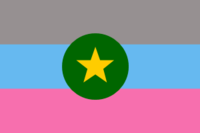Popoma
| Popoma | |
|---|---|
| Popoma | |
 | |
| Pronunciation | [[po.po.ma] (Standard) [pɔ.pɔ.mɐ̝] (West) [po.po.mɐ̝] (South)] |
| Created by | Madoka |
| Date | Mar 2020 |
| Setting | Earth |
| Ethnicity | Magical Girls |
| Native speakers | 2,200,000 (2020) |
Magical Girls' Languages
| |
Popoma was created on the XIII Century by an italian magical girl during the Great Magic War between magical girls and witches. The first purpose of the language was to hide the attack plans of the magical girls from the witches. After the end of the war, the language was considered the official language of magical girls, overthrowing the reign of the Latin language, the acceptance of the new language grew quickly, in some years, all of the magical girls living in the Italian Peninsula knew Popoma. By the end of the XIII century, from the North of Africa, to the British Isles, from the Iberian Peninsula to Asia Minor, Popoma was a well spread language around the tongues of magical girls
History
Origins of Popoma
Writing System
Popoma Alphabet
Latin Alphabet
Phonology
Consonants
| → PoA ↓ Manner |
Labial | Labiodental | Alveolar | Alveolopalatal | Palatal | Velar | Uvular | Glottal | |
|---|---|---|---|---|---|---|---|---|---|
| Nasals | m m | n n | nh ɲ | ||||||
| Plosives | Voiceless | p p | t t | k k q kʷ | |||||
| Voiced | p̌ b | d d | q̌ ɡ | ||||||
| Affricates | kh tʃ | ǩ kx | |||||||
| Fricatives | Voiceless | ph f | s s | sh ʃ | h h | ||||
| Voiced | z z | ž ʒ | rr ʁ | ||||||
| Tap or flap | r ɾ | ||||||||
| Lateral Approximants | l l | lh ʎ | |||||||
Vowels
| Front | Central | Back | |
|---|---|---|---|
| High | i ih i y | uh ʉ | u u |
| Mid | ǔ ɜ | o oh o ɔ | |
| Low | a a | ah ɐ̝ |
Phonotactics
There's a lot of vowels and consonants clusters in Popoma, some becoming part of the language as part of the alphabet, others to be exclusive to certain dialects, others that happen because of the way people speak.
The "h" Combinations
In the vowels/consonants tables there were some sounds which are written on the latin alphabet as C/V + h, which changes the sound. This are the following:
- a a --> ah ɐ̝
- i i --> ih y
- o o --> oh ɔ
- u u --> uh ʉ
- k k --> kh tʃ
- l l --> lh ʎ
- n n --> nh ɲ
- p p --> ph f
- s s --> sh ʃ
In the West Dialect, there's no h combinations with vowels, plus there's an unique consonant h combination. t t --> th ð This sound replaced the dd sound on the standard and south forms.
Other Consonant Clusters
This clusters are mostly noticed on spoken part of Popoma, this means that they were formed during the speeching process. This clusters are:
| Written | Classic Popoma Pronuciation | Modern Popoma Pronuciation | |
|---|---|---|---|
| 1 | nq̌ | ng | ŋ |
| 2 | dz | dz | d͡z |
| 3 | dž | dʒ | d͡ʒ |
Morphology
Nouns
Verbs
Adjectives
Pronouns
Adverbs
Quantifiers
Prepositions
Conjunctions
Syntax
Constituent order
Popoma is a SVO(C) language for the most part of the time, unless you are negating or interrogating. This means that the constituent order in Popoma isn't regular. The verb and the subject change positions when you want to negate or ask something. Making the SVO(C) into a VSO(C). At the end, there's a special case for this rule which will be explained further.
Magical Casting Sentences (MCS)
Like all European MGLs, Popoma has an unique way to cast their spells. It's always necessary the verb qopuh Template:IPA:kʷopʉ (to cast, to throw). In Popoma's MCS, the subject is null, a trait taken from the Portuguese Syntax rules.
null subject qopuh (conjugated on present 1st person sing. or plu.) + object + adjective + adverb of time
Object: the thing the magical girl will cast her spell to. Adjective: element to give the trait or action that will happen to the object, it also can be a infinitive form of a verb. Adverb of Time: gives the time of duration of the spell, magical girls use hours and minutes.
Unlike normal sentences, MGSs don't change orders in negation. (There's no interrogative spells). Negation of spells are often used as counter-attack against the affirmative spells, like balanced.